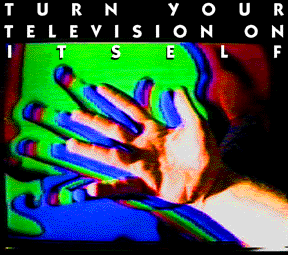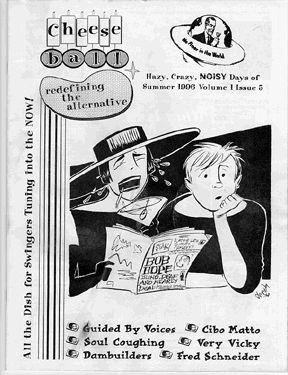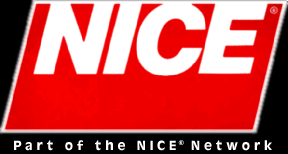 |
 |
  
 This is the cover of Cheeseball issue #5, jam-packed with goodness!
This edition hit the newsstands on Thursday, August 9th. It's free at places
like Newbury Comics, Tower Records, any of the clubs on Lansdowne Street, and
at most other funky places in Boston.
This is the cover of Cheeseball issue #5, jam-packed with goodness!
This edition hit the newsstands on Thursday, August 9th. It's free at places
like Newbury Comics, Tower Records, any of the clubs on Lansdowne Street, and
at most other funky places in Boston.So why are we telling you this? Well, this issue of Cheeseball features an interview with Noise Laboratories by the editor herself, Stacey Elizabeth Toon. Also in this issue, she interviews Soul Coughing, Guided by Voices, and Fred Schneider (!). Cheeseball is the source for all the dish for swingers tuning into the NOW! Stacey really is on the edge, "redefining the alternative" as her cover proudly proclaims. Check out a well-written 'zine that covers the lounge music scene and well beyond...and even delves deep into the territory of Noise Laboratories. In the coming days, we will post the full text of the interview as it appears in Cheeseball. Here's as much as I could manage to type this morning. Steve: Feedback is all around us. Some philosophers and scientists believe that consciousness itself is nothing but feedback; it's the brain thinking about the brain. Thinking about thinking creates feedback, and that may have been one of the sparks of human consciousness. That is what is so interesting about seeing a smaller example of a feedback system and be able to, when you look at one of these patterns, to see everything from hurricanse to swastikas, and all kinds of things in between. Some mathematicians to this day, even with chaos theory and nonlinear dynamics, say "How can such complex behavior arise from such a simple system?" These systems also have meaning in the physical world. What we have in video feedback is an incredibly simple system that is deterministic in design yet we get incredibly comoplex output from the system, even if there's no human intervention. That's exciting! When everyone thinks of fractals they think of a digital environment, and here is this totally analog environment which I never understood before producing beautiful, self- referential images. Cheeseball: Analog sound has a warmth, too, that is elusive with digital. The voice is analog. Steve: In Information Theory, noise is information. Noise is defined as the unpredictability of a signal. Sometimes the word 'random' is used, but that's not always accurate. Because a signal is unpredictable, it contains a huge volume of information. Cheeseball: In the work you have done, it at least proves that noise is not "disposable matter." It has information that evokes emotion and reaction. Steve: As [Data Integrity Engineer] Matt [LaMantia] likes to say, "Noise is information for which you don't have the decoder." Cheeseball: But when someone in the Lab interacts with your system, then they finally obtain the Green Hornet decoder ring. Steve: Exactly. Toshi: All television is interactive. It's just that people don't realize that when they just sit there and submit to the TV as reality. Mark: Stumbling into no-mind land. Steve: It's not just happening to them, they're submitting to it. Toshi: What we are doing is offering people some tools, and the cool thing about our tools is that we break down a lot of the fears people have about technology and literally, some of the stuff we find in the garbage. Stuff that people throw away can be used to make good things. A lot of what we do is a reaction to the disposable nature of society. Cheeseball: It's like keyboardists rediscovering early Moog synths as an instrument of expression. It's all a process of rediscovery. Steve: Some of our videos are "content-free" in that they do not involve anything that is "real" other than phosphorous on a screen being reproduced by phosphorous on another screen. People see what they want to see, like when they look at puffy clouds. They all see different things...and that is a useful tool, too, because it allows them to recognize their own participation in creating what is on that screen. We are all creating the world that we live in, whether or not we are watching TV. For instance: when we are walking down the street we are creating that world because we notice certain things and don't notice others. Noise Labs breaks the lock grip of "television reality." Imagine an entire cable channel that was nothing but abstract images that didn't attempt to refer to anything, that wasn't trying to teach you something, or to sell you something, or to tell you what was going on somewhere else. It would be what it is for its own sake. Cheeseball: In film there is a genre called Absolute Cinema and it strives for things that can only be defined and displayed through the process of film; moving still images at 24 frames per second. You seem to be creating Absolute Video, or better, Absolute Noise. Mark: That brings you back to Warhol's experiments at the Factory like Empire. Cheeseball: For you, the process seems more important than the product. Toshi: Our feedback is really a performance. It is beyond video in that sense. It is not just about the videotape it ends up on. Cheeseball: The tape is merely like snapshots of a stage play. Toshi: It's interesting for people to see the tapes, but like those snapshots, you have no sense of the experience of watching and participating in it. Steve: Only by people experiencing this live and actually doing it themselves can people grok this. To grok it is to understand it all at once and to understand its implications...it has a physical and emotional resonance for you. It's like if you woke up one morning and you understood Beethoven's 9th Symphony. Cheeseball: So it's like, "Aaaaaah...Bach!" (quoting Radar in M*A*S*H, obligatory television reference). Or better, "Aaaaaah...Noise Labs!"  Updated 11 October 1996 Steve Hoey, Chief Safety Inspector hoey[at]noiselabs[dot]com |